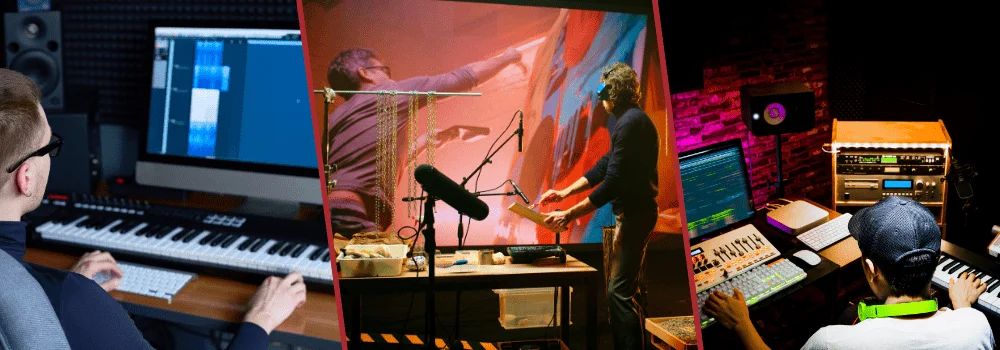How to Become a Sound Engineer?
Explore your passion for sound and explore the steps, skills, and career paths to becoming a successful Sound Engineer

In this Career Outline

Introduction to Sound Engineer
"A great sound engineer doesn't just hear music; they feel it resonate through every frequency."
Sound engineers have a crucial role to play in the music business. Everyone who has been at a concert and is amazed by the precision and general consistency of the music should praise the brilliant engineer who controls the sound. Sound engineers, also known as music engineers, blend, recreate, and control harmonization and artificial sound effects. They are not limited to the music industry alone.
Steps to Become a Sound Engineer:
Step-1
Familiarize yourself with sound theory, acoustics, and audio equipment.
Step-2
Consider pursuing a bachelor's degree in audio engineering, music production, or a similar field.
Step-3
Get hands-on experience through internships or working in studios.
Step-4
Understanding music can help you communicate better with artists and producers.
Step-5
Consider certifications in specific software or equipment to enhance your employability.
Step-6
Make sure to document your projects and work to highlight your abilities for future employers.
Step-7
Attend workshops, conferences, and industry events to connect with professionals.
Eligibility Criteria
| Eligibility Criteria | Description |
|---|---|
| Eligibility | Must possess at least 50% aggregate marks in 12th grade from a recognized board (PUC/CBSE/ICSE/ISC, etc.). |
| Educational Background | High school diploma or equivalent. |
| Undergraduate Degree | Must earn a degree in BE/B.Tech or a diploma to pursue a career as a Sound Engineer. |
| Postgraduate Degree | An M.Tech in Sound Engineering can enhance qualifications and provide better learning opportunities. |
| Entrance Exams | Should obtain a valid score in entrance exams like JEE-MAINS, CET, VITEEE, JEE-Advanced, etc. |
- Must possess at least 50% aggregate from a recognized institution in 12th, from any board PUC/CBSE/ICSE/ISC, etc.
- Should procure a valid score in entrance exams after 12th such as JEE-MAINS/CET/VITEEE/JEE-Advanced, etc.
- To become a Sound Engineer, one must earn a degree in BE/BTech or a diploma. These are the basic qualifications you will require.
- An M.Tech in Sound Engineering can also prove to be helpful while looking for a higher degree and better learning.

Not eligible to pursue this career?
Find out different career options based on your current academic accomplishments. Enquire with our career experts and build a roadmap to your career success!
Tasks to perform as a Sound Engineer:
Knowledge & Skills Required
Sound Engineers must possess a wide array of skills to succeed in their careers. Here are the key knowledge areas and skills needed to excel in this field:
| Knowledge Required | |
|---|---|
| Understanding of recording and mixing technology | Knowledge of sound waves and acoustics |
| Familiarity with various production methods | Skills in using microphones, mixers, and software |
| Proficiency in DAWs like Pro Tools or Logic Pro | Awareness of best practices and safety standards |
| Skills Required | |
|---|---|
| Problem-Solving Abilities | Communication Skills |
| Creativity | Time Management |
| Technical Proficiency | Attention to Detail |
Understanding What are soft skills? and why is it important,as they complement technical abilities and enhance overall performance in the field of Sound Engineer.

The Knowlegde and Skills don't intrigue you?
Your career may not align with your interests. Identify them and match with careers requiring those skills for faster growth and success!
Job roles offered for a Sound Engineer:
Once you qualify as a Sound Engineer, various career options open up:
Specializes in optimizing audio for delivery or broadcasting from original mixes, whether in analog or digital formats.
Manages the technical and artistic aspects of capturing sound, ensuring high-quality recordings for musicians and producers.
Captures and edits content for industrial use, collaborating with musicians and ensuring sound is recorded at the required levels.
Installs and manages sound and camera systems for live events, enhancing lighting and visuals for optimal audience experience.
Oversees audio quality for radio and digital programs, coordinating with various team members throughout the production process.

Not sure where you fit in?
With countless career options, choosing the right path can be tough. Analysis and guidance sessions help clarify what to study, pursue, and achieve.
Career Opportunities for a Sound Engineer:
Sound Engineers can opt for various fields of work in the companies listed below:
| Sound and Vision India | Cerence | Mumbai Music Institute |
| Axis Entertainment | One India | Bid Ocean |
| iCowboysMedia Software Company LLC | Sound and Vision India | Saavn |
| Seamedu |
Colleges offering courses for Sound Engineer:
Here is the list of colleges offering the Best courses after 12th:
| Creo Valley, Bangalore | Zee Institute of Media Arts, Jaipur |
| NRAI School of Mass Communication, Delhi | AIFT Atharva Institute of Film and Television, Mumbai |
| IIFA Multimedia, Bengaluru | Deviprasad Goenka Management College of Media Studies |
| CMR University, Bangalore | Mumbai Music Institute, Mumbai |
| Seamedu School of Pro-Expressionism, Pune | SAGE University, Bhopal |
| Vishwakarma University, Pune | IIFA Lancaster Degree College, Bangalore |
End Note
Becoming a Sound Engineer is an exciting journey that blends creativity with technology. With the right education, skills, and networking, you can make your mark in this vibrant industry. If you’re ready to explore your career path further, SetMyCareer is here to guide you through Career counselling after graduation along with your career goals! Connect with our experts today!
In this Career Outline
You don't fit in as a Sound Engineer?
Find out your best suitable career by booking an appointment with our experts
Book nowGet In Touch
No. 14/595, 1st Floor, Nanjappa Reddy Layout, Koramangala 8th Block, Bangalore 560095





